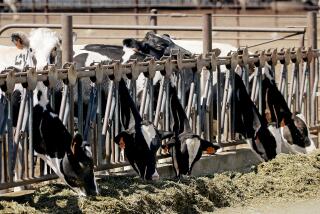Support of Anti-Fruit Fly Measures to Be Sought : Agriculture: Officials hope that warning county supervisors and the public now will prevent opposition to the aerial spraying of malathion.
Agriculture representatives plan to ask Ventura County supervisors today to support whatever efforts are needed to protect local crops from devastating fruit flies this summer--including aerial spraying of malathion if necessary.
Ventura County has never had a major infestation of the Mediterranean, Mexican or Oriental fruit flies, and authorities said they see no greater danger than usual that the pests will strike here this year.
But they said the flies or fly-infested fruit could be brought to the county by summer travelers or through illegal fruit shipments from exotic areas.
Agriculture officials said they hope that warning the supervisors and the public now about the possibility of infestation and spraying will prevent shock in the community and public opposition to spraying, which could delay eradication efforts.
âWeâre going to use everything we can to prevent malathion spraying,â said Don Reeder, a Ventura County grower and a member of the statewide Exotic Fruit Fly Coalition. âBut if it comes to that, we want people to be prepared.â
The decision to spray would be left to Gov. Pete Wilson, not the county supervisors, but Supervisor Maria VanderKolk agreed Monday that the public should be made aware now of âthe devastating consequences of this type of infestation.â
Ventura County Agriculture Commissioner Earl McPhail said about $342 million in area crops could be at stake.
âPhysically, we have the expertise and the people to handle the problem,â McPhail said. âItâs making sure that people understand the consequences and are able to handle it, more mentally than anything else.â
More than 3,000 flytraps have been set in Ventura County to detect infestations early, and more traps are planned.
The agriculture industry has been working with the U.S. Department of Agriculture to ensure an adequate supply of sterile Mediterranean fruit flies, which are released to mate with wild female flies to thwart reproduction. Use of the sterile flies, along with ground spraying of malathion pesticide in infested areas, could avoid the aerial spraying that outraged Los Angeles County residents during Mediterranean fruit fly outbreaks in 1989 and 1990.
But there is no guarantee that such eradication methods will work. And although millions of sterile Medflies have been bred, there is no similar supply of sterile Mexican fruit flies.
âWe want the supervisors to understand that agriculture is doing the best it can to comply with the rules and desires of society,â said William Henley (Hank) Brokaw, a Saticoy nursery owner and a member of the Fruit Fly Coalition. âIn my business, we look to do things that are as benign as possible, but we have to be readyâ if spraying is deemed necessary.
Dr. Lawrence E. Dodds, who heads the countyâs Public Health Department and who served on the state task force of medical experts on aerial malathion spraying, said Monday that there are no significant health effects associated with malathion spraying.
âIn the dose they use and with appropriate spraying, you might get six or eight drops in an area the size of a sheet of paper,â he said. Although that is enough to kill fruit flies, Dodds said, âitâs very dilute for humans.â
In 1989-1990, a 16-month outbreak of the Medfly forced aerial malathion spraying over 536 square miles of urban and agricultural areas in four Southern California counties south of Ventura County.
Wild Oriental fruit flies, some of which have been found in Ventura County, are of less concern than the Medfly and Mexfly because they can be more easily eliminated with poisoned bait, officials said.
All of the fruit flies destroy crops by laying eggs under the skin of fruits and vegetables such as citrus, green beans, peppers and tomatoes. The eggs hatch and their larvae feed on the fruit from the inside. Pupae--the next stage of fly development--drop to the ground, where they emerge as adult flies and repeat the cycle of destruction.
Reeder said keeping the populations down throughout Southern California is important because areas within a 50-mile radius are quarantined after a fertile fruit fly is found. That means local crops cannot be shipped to outside markets.
âWith all the fruit packinghouses in Ventura County, it would only take a find in Chatsworth to close us down,â he said.
More to Read
Sign up for Essential California
The most important California stories and recommendations in your inbox every morning.
You may occasionally receive promotional content from the Los Angeles Times.










